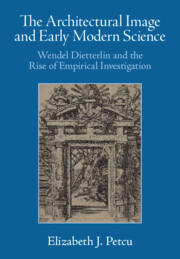 The Architectural Image and Early Modern Science
The Architectural Image and Early Modern Science Published online by Cambridge University Press: 29 November 2024
Artists, natural philosophers, and architects in fifteenth- and sixteenth-century northern Europe regarded images and image-making as sources of knowledge. Diverse practitioners of art, architecture, and natural philosophy – from artists Albrecht Dürer and Martin Schongauer to medical practitioner Walther Hermann Ryff and natural historian Conrad Gessner – used images to revive Vitruvius’s vision of architecture as both art and science, for instance in collaborating to complete the Strasbourg Astronomical Clock in 1574. Architectural ornament came to act as a model for visualizing nature’s regular forms and systems, playing a vital role in the revival of such Vitruvian interdisciplinarity. That process, in turn, prompted early modern architects and designers of architectural ornament to combine artistic and scientific techniques of visual research, a phenomenon exemplified in Dietterlin’s Architectura treatise.
To save this book to your Kindle, first ensure no-reply@cambridge.org is added to your Approved Personal Document E-mail List under your Personal Document Settings on the Manage Your Content and Devices page of your Amazon account. Then enter the ‘name’ part of your Kindle email address below. Find out more about saving to your Kindle.
Note you can select to save to either the @free.kindle.com or @kindle.com variations. ‘@free.kindle.com’ emails are free but can only be saved to your device when it is connected to wi-fi. ‘@kindle.com’ emails can be delivered even when you are not connected to wi-fi, but note that service fees apply.
Find out more about the Kindle Personal Document Service.
To save content items to your account, please confirm that you agree to abide by our usage policies. If this is the first time you use this feature, you will be asked to authorise Cambridge Core to connect with your account. Find out more about saving content to Dropbox.
To save content items to your account, please confirm that you agree to abide by our usage policies. If this is the first time you use this feature, you will be asked to authorise Cambridge Core to connect with your account. Find out more about saving content to Google Drive.